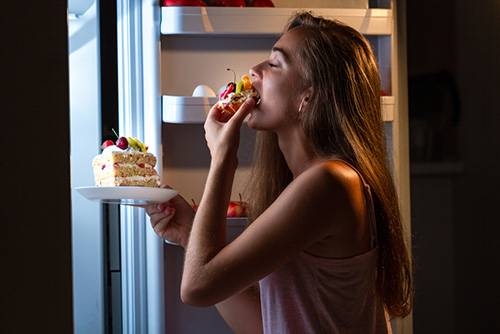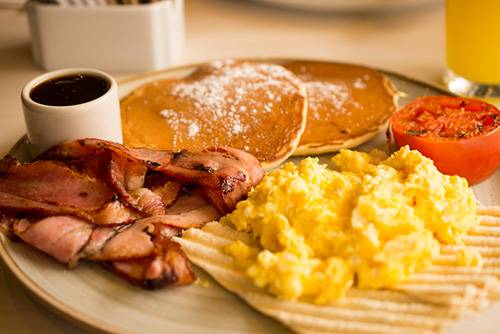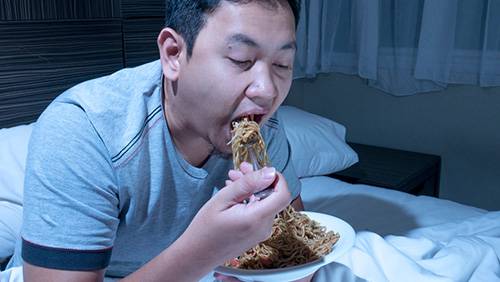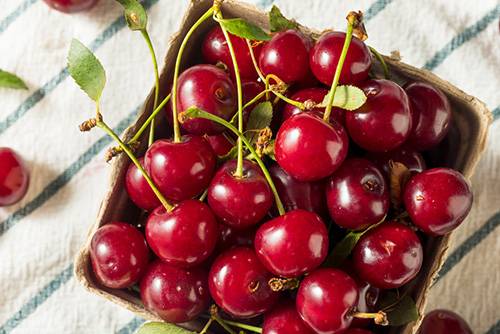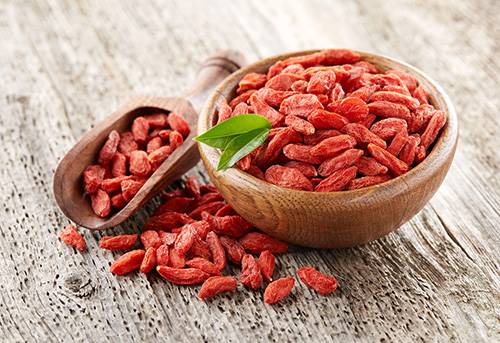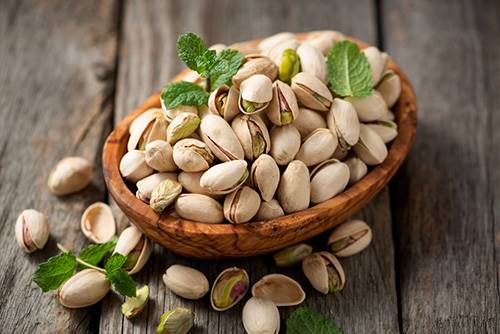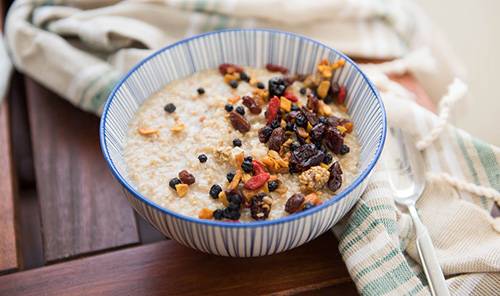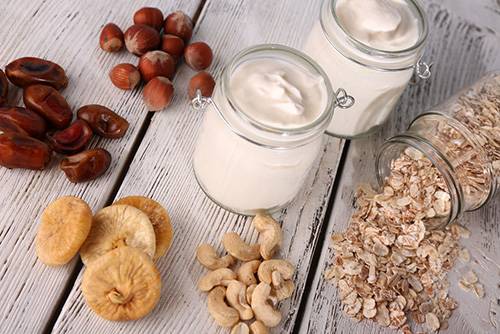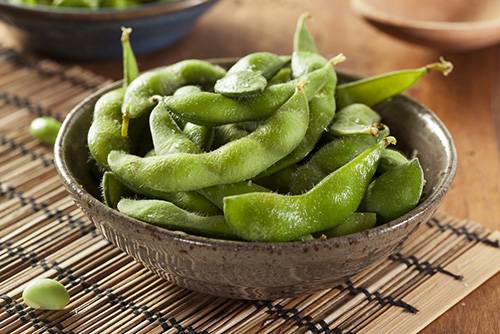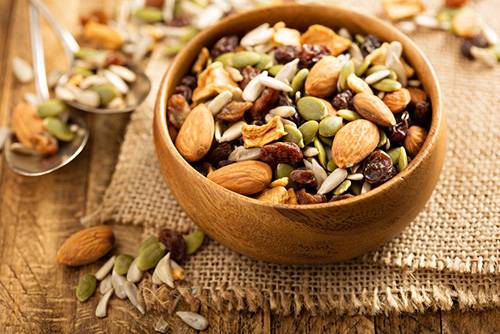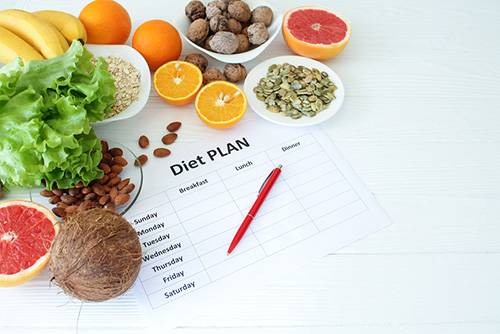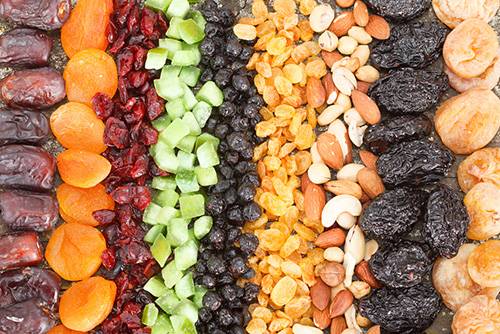
The Impact of Eating Late at Night
For a long time, people believed that eating late at night causes you to gain weight, and this was mostly backed up by animal studies that revealed the fact that one’s bodies might process calories differently once a certain hour has passed. While there are animal studies to support the theory, human studies are somewhat in contradiction to this idea.
In fact, studies mostly reveal the fact that it doesn’t matter when you eat, but it’s actually a matter of how much you eat. We actually have the habit of more unhealthy food late at night compared to what we eat earlier in the day, as studies have shown that adults have the tendency to consume up to 500 extra calories during their midnight munchies.
Aside from exercising, eating a lower number of calories is what causes you to lose weight, and not necessarily the time of day or night when you consume them. Scientific studies have shown that people who eat late at night tend to gain weight because of higher calorie consumption but they also make poor food choices compared to what they would choose to eat if it were daytime.
There are several reasons why poor food choices occur at night, with a common one being that late-night eaters don’t usually have access to healthier food options (this is especially true for those that work night shifts) since restaurants and delivery places with healthier food are usually closed.
Emotional eating is another fact that determines people to make poor food choices, and it’s really important for a person to be able to tell stress-induces hunger apart from actual hunger. People also tend to eat when they feel sad, bored, or anxious. Nutrient-dense foods are good options in such scenarios because they have a high nutritional value and provide a low calorie intake.
Adjusting Meal Timing & Frequency
One of the most important conclusions that we can draw right now is the fact that the number of calories that you consume is what directly impacts your weight. According to several bits of research, you adjust your appetite by fine-tuning the frequency and timing of your meals.
Science also backs up the idea that having a breakfast rich in calories will cause you to feel full for a longer period of time, which automatically translates into less cravings throughout the day. However, having a late night meal could eliminate the need for a breakfast, which is also fine.
Eating more often but ingesting fewer calories in one take is another potential solution around the overeating problem. There are studies that suggest that this could help manage your appetite and cause you to feel full for longer throughout the day. This process could take time but learning how to adjust your appetite so that you consume the recommended amount of calories each day and still feel full is a good approach.
DOs & DONTs of Late Night Snacking
Generally speaking, eating late at night will accomplish one of two things: it will either give you a boost of energy or help you go back to sleep. Of course, you want to avoid eating stuff that could give you that energy boost if you are the least bit interested in maintaining a healthy sleeping schedule.
If you happen to wake up to go to the bathroom and experience the munchies up to a point where you’re obsessed with grabbing a bite to eat, you want to look for foods rich in:
- Magnesium, as this is a mineral that will naturally relax your muscles.
- Whatever boosts serotonin levels, a hormone that is converted into melatonin and will help put you to sleep.
- Protein, specifically the amino acid tryptophan, as this is believed to help improve sleep quality.
Some of the foods that you want to avoid include:Those that are high in sugar and have plenty of refined carbs, such as white bread, pizza, cake, candy, etc.
- Foods that have a high acidic content (including citrus fruit).
- Drinks and foods that are high in caffeine, such as coffee, chocolate, or certain types of tea.
Late Night Snacks to Help You Sleep
If your stomach starts making a fuss after dark and you can’t ignore its rumbling because it won’t let you sleep, feeding it seems like a wise choice. However, there are foods that, due to their properties and nutritional value, can avoid leaving you with that uncomfortable sensation of fullness and might even make it easier for you to go back to sleep:
- Tart cherries – Tart cherries and their juice is one of the best late-night snacking options out there. They are believed to help you sleep because of their anti-inflammatory properties that could help with conditions such as heart disease or arthritis. According to one specific study, women that drank 8 ounces of cherry tart juice managed to sleep 1.5 hours longer after a period of two weeks. There is also a small amount of melatonin in tart cherries, a hormone that helps regulate sleeping patterns. Tart cherries also contain the phytochemical procyanidin B-2, which protects tryptophan, an amino acid that’s found in your blood and is used to produce melatonin.
- Kiwi – The fruit that’s humorously called a “potato with fur” is one of the best nocturnal foods to turn to. They offer 190 percent of your daily recommended intake of vitamin C and are also believed to help you sleep better. According to one study, people who ate kiwis one hour before going to bed started to fall asleep faster and slept 13 percent longer. Kiwis are rich in serotonin, which means that you’re likely to feel more relaxed and fall asleep faster. Serotonin can also reduce your carb cravings.
- Goji berries – This sweet-tart berry is rich in antioxidants but also has a small amount of melatonin, the sleep hormone. According to one study, participants that drank goji berry juice had improved sleep quality and found it easier to wake up in the morning as they felt well-rested. Even if the studies aren’t conclusive enough to draw a general conclusion, goji berries are still a nutritional snack that should be part of anyone’s diet.
- Pistachios – Out of all nuts, pistachios are the richest in melatonin, offering a low calorie intake and a high amount of melatonin (one ounce of pistachios contains about 6.5 mg of melatonin).
- Hot cereal – What is normally perceived as being part of a healthy breakfast is also one of the best things to eat when you’re craving a late-night snack. Whole-grain cereals are a great source of fiber and you can prepare them with a variety of healthy and delicious toppings, such as dried fruit or nuts. If you want to eat whole grains as a healthy late-night snack, you can prepare them in advance so you don’t have to cook them when you want to eat them (long cooking times are also used as an excuse to avoid this healthy snack). Besides, rice, barley, and oats are great sources of melatonin.
- Yogurt – Known for being one of the best sources of calcium, yogurt offers plenty of benefits, with some of them potentially being related to sleep. Greek yogurt, for example, contains a protein known as casein, which is believed to help reduce hunger in the morning when consumed the night before. Take note that yogurt really is a healthy option only when you choose unsweetened versions. You can combine it with other healthy ingredients that are good for promoting sleep, such as trail mix or certain types of dried fruit.
- Eggs – Eggs contain tryptophan, which is an amino acid that helps produce melatonin. The bad news is that cooking eggs in the middle of night is an idea appealing to no one, but there are ways for you to cook and preserve hard boiled eggs and consume them at a later time. For instance, you can boil them during the day and keep them in the fridge until you’re ready to consume them. They are a pretty versatile ingredient and can be consumed as they are or they can be used to make egg salad and other treats that you can indulge in even at night.
- Edamame – Edamame is one healthy source of protein that you can munch on regardless of the hour of day or night. These green and unripe soybeans are available for purchase fresh or frozen, and they can be consumed even without cooking them.
- Trail mix – This is one of the healthiest choices for a midnight snack and you can choose to purchase bags of trail mix or acquire separate ingredients and create one to your liking. The best options for trail mix ingredients are seeds, nuts, and dried fruits, with a fourth of a cup having about 173 calories. Trail mix is typically rich in healthy fats, minerals, and B vitamins, and can help boost good cholesterol levels. Some ingredients that can be found in a bag of trail mix also have melatonin, such as dried cranberries or sunflower seeds.
Can You Stop Eating Before Bed?
As we have already established, there is nothing wrong with eating late at night as long as you’re eating the correct foods and you’re not overdoing it in terms of how many calories you consume. However, there is such a thing as eating too much late at night, so if you’d rather let go of this habit, here are some tips that might help you stop eating late at night:
- Find out what’s making you eat. As we mentioned earlier in this article, you might not always be hungry when you’re tempted to eat, so it’s important to always identify what’s causing that need to reach for the snack drawer. There are several things that contribute to this late-night need for food, including eating disorders, or issues of emotional nature. Aside from identifying the cause, you also have to look for patterns or triggers that will tell you what sets off your eating behavior. For example, if you discover that you’re binge eating because of anxiety, you might want to discover what triggers a nocturnal anxiety episode so you can understand more about the origin of this habit. Having a food diary might help you in the process.
- When you plan your meals, you are more likely to form a routine that helps you avoid late-night snacks that aren’t necessary. It sometimes happens that you actually feel hungry because you didn’t feed your body enough during the day, in which case meal planning and a consistent food routine can go a long way. Adjusting your meals, as we’ve said before, could be a trial and error thing and you might even discover that what leaves you feeling more full is eating several smaller meals throughout the day rather than two huge meals.
- If you have a tendency to consume a lot of unhealthy snacks and junk food, avoid having it in the house altogether. That doesn’t mean that you aren’t allowed to ever eat chips or chocolate again, just don’t buy five bags of chips and three bars of chocolate and leave them lying around the house, because you’ll most likely attack them when you’re getting nocturnal cravings. A good idea is to replace these unhealthy treats with healthy foods you like. For instance, a bag of trail mixed or dried fruit mixed with low-fat yogurt can be an excellent snack for when your sweet tooth is activated.
- Eating protein during every meal will decrease your appetite and leave you feeling full for longer. According to one particular study, people that eat meals rich in protein have 60 percent less craving throughout the day and are 50 percent less likely to eat at night.
Conclusion
The most important thing that you have to remember is that late night snacks are acceptable as long as you don’t go cray-cray calorie-wise. There are certain types of food that increase the melatonin levels in your body or that aid in melatonin production one way or another. However, you shouldn’t rely on these foods to help you maintain a correct sleeping schedule and, if at all possible, work your ways towards avoiding waking up at night in the first place.
Photo credit: New Africa/Shutterstock; night shifts/Shutterstock;
Jacob Lund/Shutterstock; airdone/Shutterstock;Brent Hofacker/Shutterstock;
Nitr/Shutterstock;Dionisvera/Shutterstock; Anna Hoychuk/Shutterstock;
Africa Studio/Shutterstock; Elena Veselova/Shutterstock
